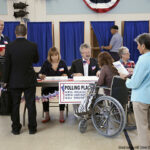- Current Events New Alabama Congressional District Selects Candidates
- Current Events Nebraska Rejects Winner-Take-All Proposal
- Citizenship Voting Under Age 18
- Citizenship Citizenship in Action
- Democratic Party Biden’s and Trump’s Recent Primary Results
- Elections Trump and Biden Win South Carolina and Michigan Primaries
Voter ID Laws: Combating Fraud or Suppressing Voters?
In September, btw brought you news of a court battle raging in Texas over a “voter ID” law. While these went into effect for the recent midterm elections, many are concerned about the potential impact on the 2016 Presidential Election. Prior to 2006, no state ever required a government-issue form of ID (even though many request some form of identification, even if it’s a current bill). Thirty states currently have some version of official voter identification regulation in place.

Credit: ©Hill Street Studios/Blend Images LLC/Glow Images ; one of the most basic needs for voting is having proper identification. This protects against voter fraud.
To get a better idea of what’s being argued, we offer a base explanation of the concerns of both sides. Using the law in Texas as an example, it requires voters to show a valid driver’s license, military ID or passport before being allowed to cast a vote.
Pro–Combating Fraud
Those in favor of restrictions put on voters say that it is important to maintain and improve the integrity of the election process. They feel that the provision is not unreasonable in a country based on the tenants of democracy. Irregularities that lead to re-vote is another issue that supporters of stricter voter requirements believe they will remedy in future elections.
The types of acceptable ID needed for voting varies from state to state. Texas includes the following seven types–driver license, passport, personal identification card, election identification certificate, military identification card (with photo), handgun license, and citizenship certificate (with photo).
Con–Suppressing Voters
Those opposed to voter ID requirements say that such laws unfairly restrict those who struggle to obtain proper identification. This includes persons with disabilities, those who lack reliable transportation, and anyone not able to afford fees associated with licenses.
Even though the Supreme Court voted to uphold Texas’s right to enforce its law, Justice Ruth Badar Ginsburg wrote a dissent (an official response to a decision by an overruled judge) saying the law will deny hundreds of thousands of eligible voters the right to cast a ballot. Another judge, Nelva Gonzealez Ramos of the U.S. District Court, called the ruling an, “unconstitutional burden on the right to vote.”
Political Agenda?
Many believe the true motivation–both for and against–is political. The demographic most affected by this law are Hispanics and African Americans, who, historically, vote Democratic. Those pushing for tougher restrictions have been Republican, who the opposition accuses of keeping potential Democrats from voting.
In Texas, a new governor will be elected in the midterm elections, which both sides hope will create some enthusiasm and encourage potential voters to make it out to the polls. In response to the voter ID law, Texas has seen a significant increase in voting by mail, which is legal, as long as people can prove that they are over 65, disabled, incarcerated, or traveling.


